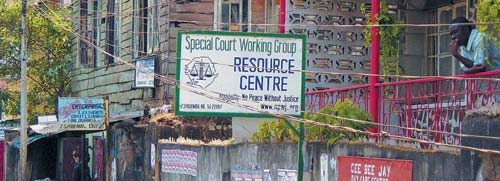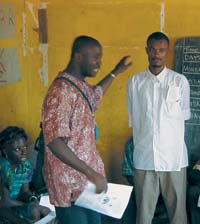Redressing Human Rights Violations in Sierra Leone
by Noah Novogrodsky
In February 2003, Noah Novogrodsky (Director of the International Human Rights Program and adjunct faculty member) travelled to Sierra Leone in West Africa along with second year student Mora Johnson as delegates of the Sierra Leone Working Group at the Faculty of Law. Their mission – to provide legal assistance to the Special Court for Sierra Leone established in 2002 to try those responsible for crimes against humanity and gross human rights violations committed over the past decade.

Sierra Leone is a tiny country in West Africa. As a former British colony, the capital - Freetown - features streets named after the same mid-level English officials whose names are central to Toronto - Dundas, Bathurst and Sackville among them.
There the similarities end. Between 1991 and 2001, the people of Sierra Leone endured a civil war fueled by diamond mining revenues and marked by grotesque human rights abuses. Both the rebels - led by the notorious Foday Sankoh - and the army of Sierra Leone, massacred civilian populations, enslaving whole villages, conscripting child combatants and committing widespread rape and sexual abuse. In the late 1990s, the armies of Sierra Leone gained notoriety by amputating the limbs of victims, first as a warning and punishment used to discourage potential voters from casting ballots and later as an instrument of terror. By 2002, Sierra Leone ranked last on the UNDP’s index of living standards.

Mohammed Suma of the Special Court's Prosecutor's Office conducts outreach and popular education about the Court at a community centre in Freetown, Sierra Leone. |
The United Nations and British Special Forces intervened to stop the worst human rights abuses in Sierra Leone; the UN has since created the largest peacekeeping force in the world there. In 2002, Sierra Leone held democratic elections. That same year, the United Nations and the Government of Sierra Leone began construction of the Special Court for Sierra Leone, a hybrid tribunal staffed by a mixture of foreign and Sierra Leonean lawyers and judges and designed to try those who “bear the greatest responsibility” for human rights violations committed during the conflict. The Special Court, which issued its first indictments in March 2003, will try those responsible for crimes against humanity, war crimes and grave violations of Sierra Leonean law. Located in Sierra Leone, the Special Court will attempt to provide justice to the thousands of victims. Just as importantly, the Court will be seen to provide justice. In a country that has known virtually no rule of law for a decade, the Court aims to leave the legacy of a world-class courthouse, a cadre of trained Sierra Leonean lawyers and the precedent of the Court’s jurisprudence. Sierra Leone has also convened a Truth and Reconciliation Commission (TRC) that will record a history of the conflict. Both the Special Court and the TRC have a distinctly Canadian flavour: Canadian law professor William Schabas serves on the TRC while Canadians serve in several critical positions at the Court. Valerie Oosterveld, former Director of the International Human Rights Program and now a lawyer at the Department of Foreign Affairs and Foreign Trade worked tirelessly at the UN to establish the Special Court and now sits on the UN Management Committee that funds the Court.
In February, I traveled to Freetown with Mora Johnson (II), head of the Sierra Leone Working Group (SLWG). Since November 2002, the SLWG has been providing legal research for the Special Court’s Office of the Prosecutor. The SLWG, like the Rwanda Working Group before it, is an initiative that allows students the opportunity to organize members of the law school community to advocate on specific international human rights issues. Working groups are also a vehicle for NGOs, DFAIT and intergovernmental organizations to request and receive research, advocacy and/or education from interested students. Mora and I went to Sierra Leone as part of the Special Court’s Prosecutor’s Office Academic Consortium and to consider if and how we might share relevant experiences of the Rwanda Working Group, who have spent years advocating for the development of a responsive sex crimes jurisprudence at the International Criminal Tribunal for Rwanda.
What we found was simultaneously disturbing and inspiring. At the Aberdeen camp for amputees in Freetown, men, boys and women whose limbs were amputated during the conflict wait for medical procedures and resettlement. A single Canadian doctor provides medical services for hundreds of families in the camp. Edward Soriba recounted for us how he left his family during the January 6, 1999, invasion of Freetown. Captured by an army faction, his left arm was amputated on the orders of an officer who remains stationed in Freetown. Rather than seek revenge, however, Edward is hopeful that the persons responsible for his amputation will be prosecuted by the Special Court and asked that the international community not forget the suffering of Sierra Leone.
Prosecution, according to Mohammed Suma and Tom Perriello of the Office of the Prosecutor’s Outreach Program, will happen only if the perpetrators qualify as kakatua, the local word for those who bear the greatest responsibility. But unlike many transitional societies, most of the Sierra Leonean kakatua are in prison, including Foday Sankoh. This fact gives the Special Court an opportunity to prosecute and not merely indict human rights abusers.
In the process, the Special Court will be the first international criminal institution to address seriously the crimes of recruiting child combatants and engaging in sexual slavery. The Special Court will also seek to preserve the fragile peace in Sierra Leone by removing from society those who would resume the war and commit fresh human rights abuses. All told, the Special Court aims to complete its work within three years and to play a positive role in the reconstruction of Sierra Leone.
To do so, the Court will have to improve on the mistakes of the ad hoc international criminal tribunals for the former Yugoslavia and Rwanda. Those institutions are frequently criticized for failing to promote justice at the site of the offenses, for providing inadequate protection for witnesses and for revictimizing those witnesses who do testify.
The Sierra Leone Working Group is working with the Special Court to apply the lessons of existing international tribunals and to conduct legal research for the Office of the Prosecutor. During the summer of 2003, at least two University of Toronto law students will travel to Sierra Leone to intern with the Special Court and the TRC. Although the problems Sierra Leoneans face are enormous, the Sierra Leone Working Group is pleased to participate in the Academic Consortium, to contribute to the development of international human rights law and to promote the justice that Soriba seeks.
This article first appeared in Nexus, Spring 2003.
See also Noah Novogrodsky's article "Taylor must not escape judgment," the National Post, June 9, 2003.



